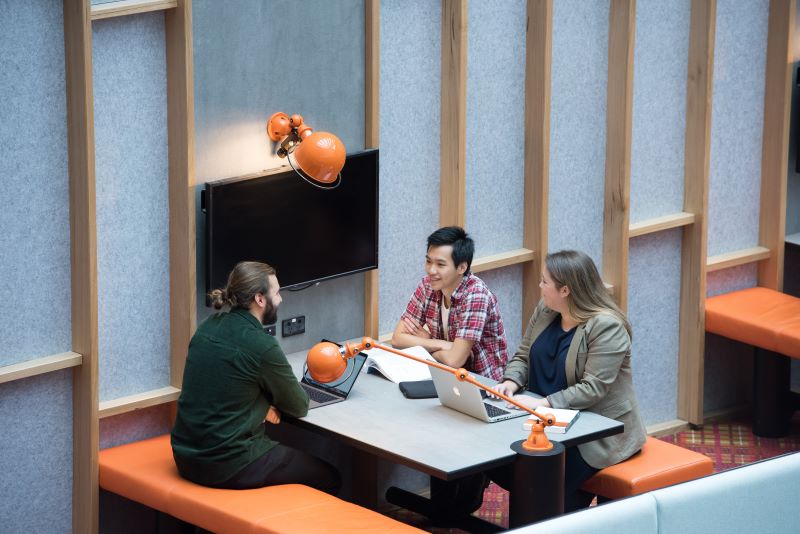Postgraduate study has many benefits, from enhancing your career to growing your networks. However, balancing commitments like work, family and social responsibilities while pursuing further study can be a challenge for many postgraduate students.
Follow these online postgraduate study tips to meet your academic goals and maximise the effectiveness of your postgraduate journey.
Manage your time for maximum productivity
Online study is convenient and accessible, giving you the opportunity to gain new knowledge wherever you are. But to make the most of this flexibility, you’ll need dedicated study time that’s organised, well-structured and aligned with your goals.
Here’s how you can create effective study habits that put you in control.
Create a structured study timetable
- Commit to scheduled study time throughout your week. This could be a fixed time every morning or a whole day, whatever works best for you
- Let work and family know when you’re unavailable
- Keep your study materials organised so you can make the most of your allocated time
- Add important university dates to your calendar and set reminders.
Make use of digital tools and planners
- Keep your study materials in one place with cloud note-taking apps such as Evernote or OneNote
- Maximise your study opportunities: apps like Forest or Pomodoro remove distractions and create blocks of focused time
- Manage priorities and due dates with management tools like Trello or Monday.com.
Break down assignments into smaller, more manageable tasks
- Identify which task components will be straightforward and which tasks may require more time, concentration or support to complete
- Set achievable, measurable milestones for assessment tasks and focus on one at a time
- Schedule breaks and take them seriously. Get up from your device, stretch and change your scenery.
Reflect on your progress and opportunities to improve
- Regularly evaluate how your study is progressing. Identify areas where you’re excelling and where you might need more support
- Consider keeping a study journal to track your time management habits and reassess your goals
- Utilise your course online discussion board to share what you’ve learnt with your network, exchange study tips and collaborate on ideas.
Avoid burnout by making time for what you love
- Make sure your study schedule includes time for friends and family commitments
- Enjoy your downtime guilt-free, knowing you’re working hard to enhance your career
- Use study breaks intentionally, so you can return to your next online term focused, energised and motivated to do your best.
Use active learning techniques
Get the most out of recorded study resources
Before you start
- Preview the content by scanning transcripts for key words or phrases, so you’re familiar with the ideas being presented and can better focus on understanding the core themes
- Assess your prior knowledge by attempting to answer questions or solve problems to gauge your current understanding.
While you’re listening or watching
- Take an active listening approach and make notes, record observations and summarise important concepts, facts and ideas. Pause if needed to make sure you don’t miss anything
- Rewind and replay to ensure you fully understand the content before proceeding
- Practice and apply demonstrations and practical applications to reinforce what you’re learning
- Pause and reflect on what you’ve engaged with
- Form questions to be addressed later through further research, or discussion with peers and support services
- Make connections between what you’re learning and what you already know to deepen your understanding.
After your study session
- Do a 60-second review immediately after watching or listening to capture what you’ve studied and move it from your short-term to long-term memory
- Rewrite your notes to review the lesson and further consider its meaning and application
- Test yourself to improve your academic performance. Ask your favourite AI tool to create three to five-minute quizzes based on your study material and compare your results over time.
Apply proven study techniques
Active recall study method
Attempting to recall information from memory before referring to your notes helps to synthesise knowledge and strengthen your neural pathways. You might try testing yourself, attempting past exams, or teaching someone else what you’re learning.
Spaced repetition study method
As you progress in your study, decrease the frequency at which you review your material. Start with immediate and repeated reviews, then gradually increase the intervals to help build your long-term memory.
Summarisation study method
Condensing what you’re learning into key ideas and concepts, in your own words, will help to understand and retain information, and is a useful skill for any academic researcher to have.
Take effective notes
Taking notes throughout your postgraduate journey while studying helps to improve your engagement with the text, but the way you take notes can change their effectiveness.
Choose the medium that works best for you
The most effective note-taking strategy is one that aligns with your learning style and supports your long-term understanding. While research suggests that hand-written notes aids memory retention1 and typed notes results in more passive engagement, you may want to experiment different note-taking styles to find what helps you focus and retain course material.
- Digital notes may make it easier to return to later and can be accessible from anywhere
- Paper notes may make it easier to draw diagrams or mind maps, and organise your thinking in a freehand way
- You could try a combination of methods, converting paper notes to a digital format that’s searchable later.
Be selective about what you record
- Don’t write down everything
- Do ask and respond to questions like:
- What is the main idea?
- What evidence or examples support that idea?
- What conclusion(s) does the writer or speaker reach?
- What is your position on those conclusions?
Critically evaluate while you study
The ability to assess the value of information is a vital skill for postgraduate students. While you’re learning, consider:
- What makes this information reliable?
- Has it come from a reputable institution or publication?
- How recently was it published?
- Do other sources refer to it in their own research?
Find out more about notetaking and synthesising for postgraduate study.
Collaborate with peers to maximise your study skills
- Discuss the possibility of forming a study group. Real-time calls and messaging apps can both be effective group study tools
- Talk about goals, ambitions and specific areas of interest
- Schedule sessions that work for the group. Shared calendars and online scheduling tools can make it easier to bring everyone together.
Sharpen your research and writing skills
Success in postgraduate study requires strong academic skills, including critical thinking, research and writing.
Use online resources to improve your study techniques
The University of Melbourne supports every student’s ambition to improve their writing. You’ll have opportunities to join academic skills workshops, attend free seminars and connect with academics as you hone your reading, writing and referencing skills.
Reflect on what you’re learning
Throughout your postgraduate life you'll explore new ideas, theories, research and practical outcomes. Reflective writing is an opportunity to think deeply about what you’re learning and consider its impact on you and your future decisions.
Great reflective writing will help you draw connections between your personal experiences and theory.
Get personalised feedback and support
Studying online at the University of Melbourne means you’re always supported to perform at your best.
To further enhance your postgraduate writing skills, book a 1:1 session with a Writing Mentor or Adviser and receive personalised feedback and advice on your work.
Master online learning with the University of Melbourne
Studying your postgraduate degree online offers an ideal balance of flexibility and world-class education.
You’re in control
- You have the freedom to study wherever you are. Experiment with what works best for you; whether it’s on your morning commute, waiting at school pick-up or a cosy corner at your local library
- With the option to engage in live online sessions or catch up later, you can manage your time around other commitments
- Subjects are taught in 8-week blocks, you can focus on one at a time and take breaks when needed.
Grow valuable networks through postgraduate study
- Learn from world-leading academics with relevant and diverse industry experience
- Connect with peers who are ambitious and motivated, just like you
- Engage in deeper conversations about study plans, career goals and future opportunities.
Take advantage of online learning support
- Access resources designed to help you get the most from your online postgraduate study, such as:
- IT support
- Online eBooks and journal articles from the University of Melbourne Library
- Health and fitness resources
- Experienced medical practitioners through Telehealth consultations and counselling sessions
- 24/7 access to mental health crisis support.
- Connect with an Academic Mentor to talk through ideas, share goals and ask questions
- Schedule a 1:1 appointment with a Student Success Adviser for personalised support when you need it.
Elevate your future with the University of Melbourne
Postgraduate study is more than just a qualification. It’s an opportunity to take your career further. While there are many tools to support your journey, the university you choose can also play a role in your academic success. Here are just few ways that the University of Melbourne sets you up with a solid foundation for your online postgraduate study.
Learn from world-leading academics
World-leading academics shape each course through cutting-edge research and the latest industry insights. Their expertise fuels a curriculum designed to give you a competitive edge and immediate career impact.
You’re in control of your journey
Whether you choose to learn in real-time or engage on demand when it works better for your schedule. Studying online at the University of Melbourne is designed to work with your life.
Gain immediate influence
From your very first day as a University of Melbourne student, you are empowered to make real-world impact. Each subject is designed to expand your expertise, sharpen your critical thinking and build on your passion.
Get the edge to become the expert others look to with online courses from the University of Melbourne. Connect with our team of Online Education Advisers to see where your study journey could lead you.
Resources
1 The Neuroscience Behind Writing: Handwriting vs. Typing—Who Wins the Battle, MDPI.com, 2025


